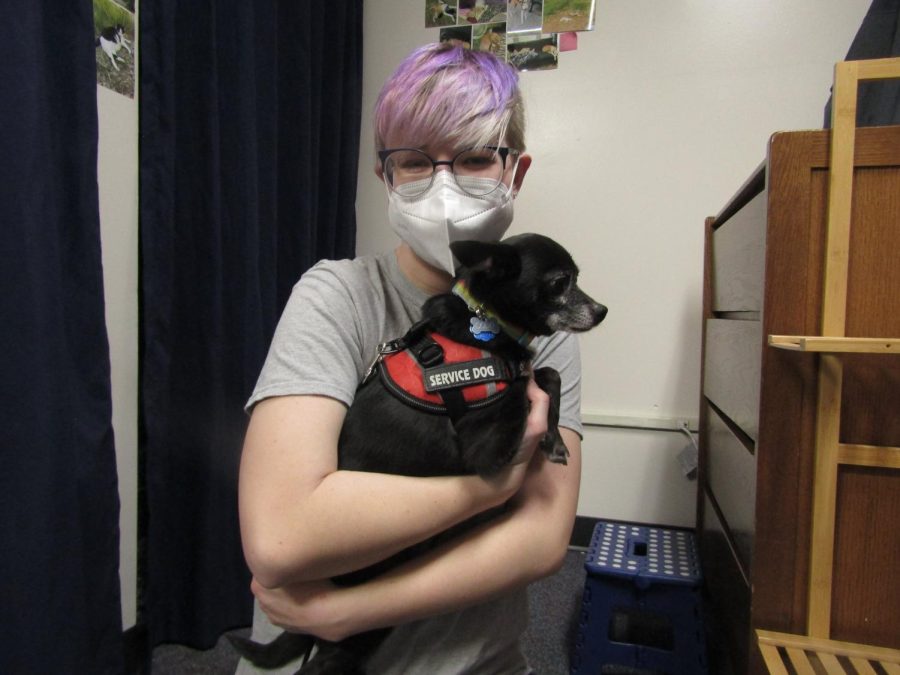ESAs, Service Animals and Students, Oh My!
Loving owner Tempest Allred and Cobb, a medically trained alert dog
January 26, 2022
Simpson College’s student housing was built for humans, but many residents have four paws, fluffy tails and don’t attend classes. These residents are emotional support animals (ESAs) or service animals.
It’s important to note that ESAs are not service animals. Tempest Allred, a sophomore living in Picken Hall, has a service dog of their own named Cobb.
“An ESA doesn’t need to be trained, and they’re mostly for emotional support. So they’re in your rooms, they’re in houses while service animals are trained for at least two specific tasks to aid with a disability,” Allred said.
While they aren’t service animals, ESAs are still very helpful. In a 2015 Counseling Today Article, Cynthia K. Chandler writes that scientific evidence shows even untrained animals lower anxiety, relieve loneliness, enhance social engagement, and reduce pain, stress, heart rate, blood pressure and depression.
Considering these benefits, it’s unsurprising that Director of Student Accessibility Services Monica Lewis, with whom students seeking an ESA must meet during the accommodation process, says she’s seen an uptick in ESA requests during the pandemic.
“Within the last two years, we have seen a large increase of ESA requests from incoming students their first year. Also, with the pandemic, some individuals have sought out mental health services, which is leading to new diagnoses,” Lewis said.
Megan Sites is one of the many students Lewis was discussing. She got her calico cat, Asami, as an ESA at the beginning of last school year and has found her incredibly rewarding.
“It really helps, she makes me feel so happy,” Sites said.
Asami was so helpful that Sites’ roommate, Alizia Guzman also got an ESA, a black kitten named Senna this winter.
“When you’re upset, they can just tell,” Guzman said. “They’re so helpful for dealing with anxiety and depression.”
The drawback to getting an ESA instead of a service animal comes from their inability to access different parts of campus.
“[Service animals] have public access rights, so they can go into public spaces,” Allred said.
Allred takes Cobb to class so he can alert them to a medical emergency at any time. A student with an ESA wouldn’t be able to take their animal to class, Kent Campus Center or a sporting event that doesn’t allow animals because ESAs, lacking training, don’t have those same public access rights.
“Sometimes I feel bad they’re in such a small room,” Sites said.
Some students have complained that ESAs are just a way for others to hack the system so they can have pets on campus but Lewis disagrees. She points out that students must have documentation of a disability, completed registration paperwork and a doctor’s note to even be eligible to bring an animal into campus housing.
“I like to believe that doctors and mental health professionals are doing their due diligence and not inflating the need for an ESA,” she said.
Even with all that paperwork, Guzman and Sites stressed that it’s much easier to get an ESA than a service animal.
Regardless of which option students had chosen for their animal companion, they all agreed that their furry friend makes life on campus better. Anyone interested in getting a service animal or an ESA can contact Monica Lewis in the Center for Academic Resources at monica.lewis@simpson.edu.







